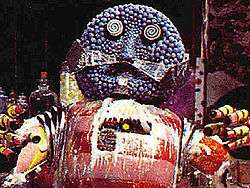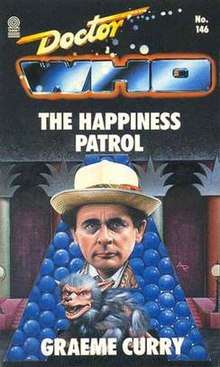The Happiness Patrol
| 149[1] – The Happiness Patrol | |||||
|---|---|---|---|---|---|
| Doctor Who serial | |||||
 "The Kandy Man" | |||||
| Cast | |||||
|
Others
| |||||
| Production | |||||
| Directed by | Chris Clough | ||||
| Written by | Graeme Curry | ||||
| Script editor | Andrew Cartmel | ||||
| Produced by | John Nathan-Turner | ||||
| Executive producer(s) | None | ||||
| Incidental music composer | Dominic Glynn | ||||
| Production code | 7L | ||||
| Series | Season 25 | ||||
| Length | 3 episodes, 25 minutes each | ||||
| Originally broadcast | 2 November–16 November 1988 | ||||
| Chronology | |||||
| |||||
The Happiness Patrol is the second serial of the 25th season of the British science fiction television series Doctor Who, which was first broadcast in three weekly parts on BBC1 from 2 to 16 November 1988.
The serial is set on the Earth colony world Terra Alpha. In the serial, the alien time traveller the Seventh Doctor (Sylvester McCoy) starts a rebellion against the planet's ruler, Helen A (Sheila Hancock), a woman who seeks to eliminate all unhappiness on the planet.
Plot
The Seventh Doctor and Ace visit a human colony on the planet Terra Alpha, where the planet's secret police force, the Happiness Patrol, roam the streets hunting down and killing so-called 'Killjoys'. The colony is governed by Helen A, who is obsessed with eliminating unhappiness. Also in her employee is the Kandy Man, a grotesque, sweet-based robot created by Gilbert M, one of Helen A’s senior advisers.
The Doctor and Ace meet an unhappy guard Susan Q, who becomes an ally, and Earl Sigma, a wandering harmonica player. They, along with the native inhabitants of Terra Alpha, the Pipe People, work to overthrow the tyranny of Helen A. They begin supporting public demonstrations of unhappiness, encouraging the people to revolt, and attempting to expose Helen A's population control programme to Trevor Sigma, an official galactic census taker.
The first to be disposed of is Helen A’s pet Stigorax, Fifi, a rat-dog creature used to hunt down the Pipe People, as it is crushed in the pipes below the city when Earl causes an avalanche of crystallised sugar with his harmonica. Then the Pipe People destroy the Kandy Man in a flow of his own fondant surprise (previously used to execute dissidents). Realising that she is beaten, Helen A attempts to escape the planet in a rocket, only to discover that the rocket has already been commandeered by Gilbert M and Joseph C, her husband. She tries to flee, but the Doctor stops her, and tries to teach her about the true nature of happiness, which can only be understood if counterbalanced by sadness. Helen A at first sneers at the Doctor, but when she discovers the remains of her beloved pet Fifi, she collapses in tears, and finally feels some sadness of her own.
Production
Working titles for this story included The Crooked Smile.[2] The production team considered transmitting this story in black and white to fit with its intended film noir atmosphere.[2] A fan myth holds that the third episode was supposed to be animated, but this was never the case.[3] The entire serial was shot in studio in July and August 1988.[4]
Helen A was intended to be a caricature of then British Prime Minister Margaret Thatcher.[5] Hancock stated that she "hate[d] Mrs Thatcher with a deep and venomous passion".[4] In 2010, Sylvester McCoy told the Sunday Times: "Our feeling was that Margaret Thatcher was far more terrifying than any monster the Doctor had encountered". The Doctor's calls on the drones to down their tools and revolt was intended as a reference to the 1984-1985 miners' strike.[5] Most of this element was eventually toned down.[2]
In the story, the Doctor sings "As Time Goes By", the song famously sung by Dooley Wilson in the 1942 film Casablanca. John Normington played Morgus in The Caves of Androzani, and later appeared in "Ghost Machine", an episode of the Doctor Who spin-off Torchwood.
Broadcast and reception
| Episode | Title | Run time | Original air date | UK viewers (millions) [6] |
|---|---|---|---|---|
| 1 | "Part One" | 24:51 | 2 November 1988 | 5.3 |
| 2 | "Part Two" | 24:48 | 9 November 1988 | 4.6 |
| 3 | "Part Three" | 24:25 | 16 November 1988 | 5.3 |
Bassett's complained over the similarity between the Kandy Man in this story and their trademark character. The BBC agreed not to use the Kandy Man again.[2]
In The Discontinuity Guide, Paul Cornell, Martin Day and Keith Topping identify a gay subtext to the story: "there's entrapment over cottaging, the TARDIS is painted pink, and the victim of the fondant surprise is every inch the proud gay man, wearing, as he does, a pink triangle."[7] The story ends with Helen A's husband abandoning her and leaving with another man.
Rowan Williams, Archbishop of Canterbury, referred to this story in his 2011 Easter sermon, on the subject of happiness and joy.[8] Marc Sidwell has described it as an expression of national unease at rave culture.[9]
Ian Berriman of SFX wrote that The Happiness Patrol was "far superior" to Dragonfire, particularly praising the Kandyman and the supporting cast. However, he felt that "while the script is brimming with witty, provocative ideas and droll one-liners, it struggles to piece them together into a satisfying narrative".[10] Radio Times reviewer Patrick Mulkern described it as a "clever and funny satire" and praised the acting and political commentary.[4] DVD Talk's John Sinnott gave The Happiness Patrol five out of five stars, calling it a "minor masterpiece". He commended the irony, social commentary, and McCoy's acting.[11]
Commercial releases
In print
 | |
| Author | Graeme Curry |
|---|---|
| Cover artist | Alister Pearson |
| Series |
Doctor Who book: Target novelisations |
Release number | 146 |
| Publisher | Target Books |
Publication date | 15 February 1990 |
| ISBN | 0-426-20339-9 |
A novelisation of this serial, written by scriptwriter Graeme Curry, was published by Target Books in February 1990. Adapting his scripts rather than the televised version, Curry's book includes scenes cut during editing and his original envisioning of the Kandy Man with a human appearance, albeit with powdery white skin and edible candy-cane glasses. An unabridged reading of the novelisation by Rula Lenska was released by BBC Audiobooks in July 2009.
Home media
The Happiness Patrol was released on VHS on 4 August 1997, by BBC Worldwide. It was then released on DVD on 7 May 2012 alongside Dragonfire as part of the "Ace Adventures" box set.[12][13] This serial was also released as part of the Doctor Who DVD Files in Issue 119 on 24 July 2013.
References
- ↑ From the Doctor Who Magazine series overview, in issue 407 (pp26-29). The Discontinuity Guide, which counts the four segments of The Trial of a Time Lord as four separate stories and also counts the unbroadcast serial Shada, lists this story as number 153. Region 1 DVD releases follow The Discontinuity Guide numbering system.
- 1 2 3 4 The Happiness Patrol at Doctor Who: A Brief History of Time (Travel)
- ↑ BBC - Doctor Who Classic Episode Guide - The Happiness Patrol - Details
- 1 2 3 Mulkern, Patrick (17 September 2012). "Doctor Who: The Happiness Patrol". Radio Times. Retrieved 13 October 2012.
- 1 2 Adams, Stephen (14 February 2010). "Doctor Who 'had anti-Thatcher agenda'". The Daily Telegraph. Retrieved 14 October 2012.
- ↑ "Ratings Guide". Doctor Who News. Retrieved 28 May 2017.
- ↑ Cornell, Paul; Day, Martin; Topping, Keith (1995). "The Happiness Patrol". The Discontinuity Guide (reprinted on BBC Doctor Who website)
|format=requires|url=(help). London: Virgin Books. p. 343. ISBN 0-426-20442-5. Retrieved 21 April 2009. - ↑ Williams, Rowan (24 April 2011). "Archbishop of Canterbury's 2011 Easter Sermon". archbishopofcanterbury.org. Retrieved 6 May 2012.
- ↑ Sidwell, Marc (21 August 2014). "Who's back: The Doctor is the unexpected freedom fighter our civilisation still needs". City AM.
- ↑ Berriman, Ian (4 May 2012). "Doctor Who: Ace Adventures Review". SFX. Retrieved 13 October 2012.
- ↑ Sinnot, John (19 May 2012). "Doctor Who: The Happiness Patrol". DVD Talk. Retrieved 13 October 2012.
- ↑ DWM 433
- ↑ "DVD Schedule Update". Doctor Who News. 2011-03-05. Retrieved 2013-10-09.
External links
| Wikiquote has quotations related to: Seventh Doctor |
- The Happiness Patrol at BBC Online
- The Happiness Patrol at the Doctor Who Reference Guide
- Script to Screen: The Happiness Patrol, by Jon Preddle (Time Space Visualiser issue 42, January 1995)
Reviews
- The Happiness Patrol reviews at Outpost Gallifrey
- The Happiness Patrol reviews at The Doctor Who Ratings Guide
Target novelisation
- Doctor Who - The Happiness Patrol reviews at The Doctor Who Ratings Guide
- The Happiness Patrol title listing at the Internet Speculative Fiction Database